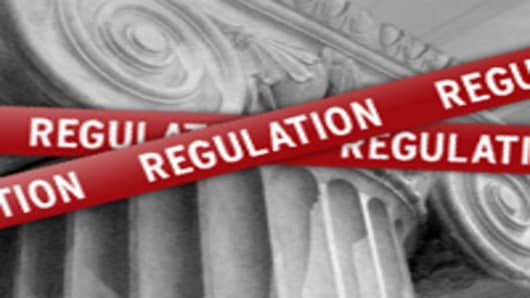More than a year after Lehman Brothers' collapse set off a financial panic, Senate negotiators are laboring to seal a deal over a consumer protection dispute holding up broad legislation to establish new rules for Wall Street.
At issue is whether a government consumer watchdog should be free from bank regulators to write rules that govern everything from credit card and overdraft fees to payday loans and mortgages.
Key negotiators in the Senate Banking Committee are closing in on an agreement that would house a government consumer entity inside the Federal Reserve but give it autonomous power to write regulations, three people familiar with the talks told the Associated Press.
The sources spoke on the condition on anonymity because they were not authorized to discuss the evolving talks publicly.
The idea, proposed by Republican Sen. Bob Corker of Tennessee, could break the logjam that has prevented a bipartisan bill from emerging in the Senate. While the sources said the Banking Committee's chairman, Democrat Christopher Dodd of Connecticut, was seriously entertaining the plan, it was unclear whether the committee's top Republican, Sen. Richard Shelby of Alabama, was receptive to it. His spokesman said Shelby was reviewing the proposal.
The idea would be a retreat from President Barack Obama's initial insistence on a stand alone agency, a demand that the White House has since dropped to give Dodd more room to find a compromise.
But Dodd on Tuesday was already encountering skepticism over the plan from some Democrats on the committee who have faulted the Fed for not being aggressive enough in guarding consumers.
'The question I would raise is, why the Fed?" said Sen. Jeff Merkley, D-Ore. "Why put consumer protection back in the Fed after it's been so woefully neglected."
Sen. Sherrod Brown, D-Ohio, said he, too, had concerns about placing a consumer protection division within the Fed. "We've seen in the past that it hasn't worked when consumer protection is not primary for any agency, for any group, that it get shuttled aside," Brown said.
Business and banking groups also were cool to the idea of a consumer financial protection agency, no matter where it was located, that had independent rule writing power.
"Proposals that simply house the CFPA within another federal agency but continue to give it the same broad and overlapping regulatory authority will not fix the CFPA nor the harmful impact it will have on small businesses and consumers," said Ryan McKee, senior director of the U.S. Chamber of Commerce's Center for Capital Markets.
While the political world has focused on attempts to revive health care legislation, tougher Wall Street regulations could end up being this year's biggest legislative accomplishment. The House passed its version of the bill in December. And President Barack Obama has made new regulations a priority in his response to the recession.
Still, a Fed-housed consumer entity would fall short of Obama's initial demand for a stand-alone Consumer Financial Protection Agency that would replace the consumer oversight now assigned to bank regulators. The House-passed version would create a separate agency.
White House spokesman Robert Gibbs said Tuesday the White House will reserve judgment on whether a Fed-housed agency would have the independence the president wants.
"If the president decides the proposal — any proposal — lacks the independence he desires, we will work to strengthen that on the floor," he told reporters.
Gibbs said the White House is less concerned about where the agency would be housed than it is with whether or not it would have the independence to set rules and regulations, and the independence to implement them.
If the latest Senate plan were to hold, it would represent a remarkable turnaround for the Fed, which has been criticized for failing to adequately protect consumers as part of its regulation of state-chartered banks and bank holding companies.
Consumer advocates prefer the House-passed financial regulation bill. They criticized a plan that Dodd floated Friday to place the agency inside the Treasury Department because it would give bank regulators the right to appeal consumer regulations. Shelby and Corker also opposed it.
The consumer agency has been the final obstacle in Dodd's effort to get bipartisan support for the bill. The legislation also would create a council of regulators that would determine which financial institutions deserve special supervision because their size and breadth could pose a threat to the economy. The legislation also would provide a mechanism to dismantle large failing institutions, with the cost borne by their banking peers.


